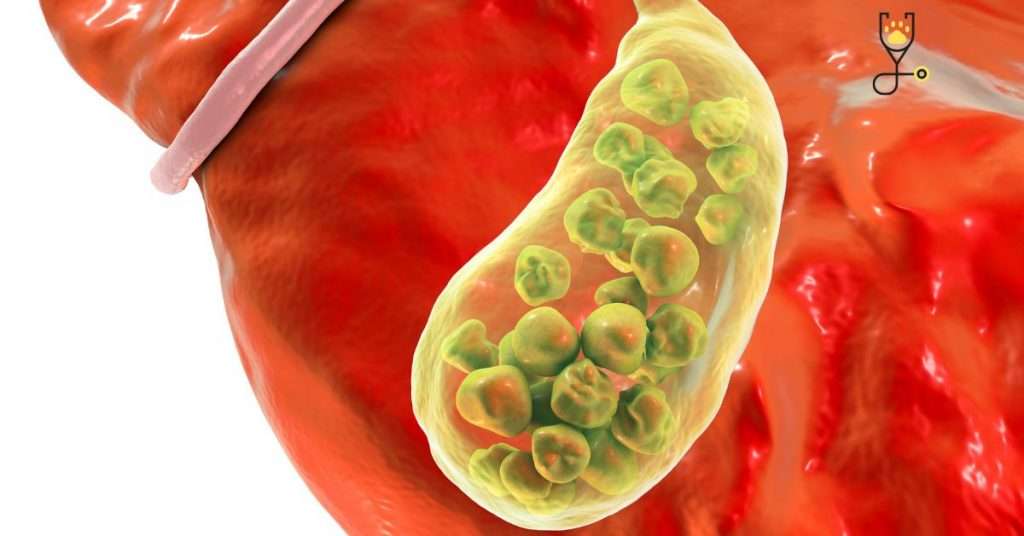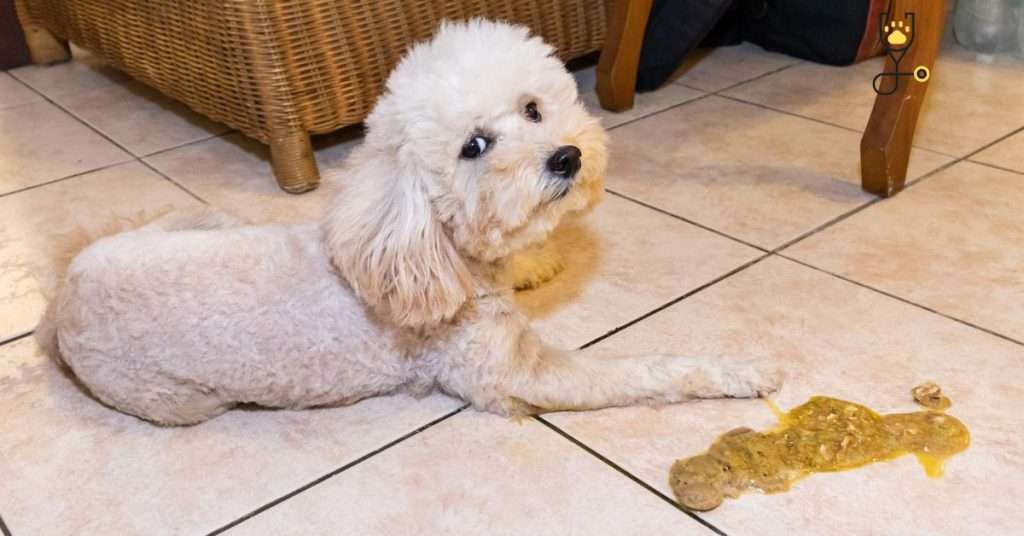If your dog has a gallbladder disorder, it can be a scary time. Not only do you have to worry about your dog’s health, but you also have to worry about the cost of treatment. Fortunately, many gallbladder disorders in dogs can be treated with medication and diet changes. Here is what you need to know about gallbladder disorders in dogs.
Learn More: What Is the Natural Diet of a Dog in the Wild?
What is Gallbladder Disorder?
The gallbladder is a small, greenish organ located on the underside of the liver.

It stores and concentrates bile, which is released into the small intestine to help break down fat. Gallbladder disorders can cause pain and problems with digestion. When the gallbladder becomes diseased, it can no longer store or release bile properly. This can lead to a build-up of toxins in the body and pain for your dog.
Types Of Gallbladder Disorders In Dogs
Gallbladder disorders in dogs are not uncommon and can range from mild to life-threatening. The most common type of gallbladder disorder are:
– Cholecystitis: which is an inflammation of the gallbladder. Cholecystitis can be caused by a variety of things, including infections, blockages, or even tumors.
– Cholecystitis: is the most common type of gallbladder disorder in dogs. It is an inflammation of the gallbladder that can be caused by infections, blockages, or even tumors.
– Pancreatitis: is another type of gallbladder disorder that can occur in dogs. Pancreatitis is an inflammation of the pancreas that can be caused by a variety of things, including infection, trauma, or even tumors.
– Gallstones: are another type of gallbladder disorder that can occur in dogs. Gallstones are small stones that form in the gallbladder and can cause pain, vomiting, and even pancreatitis.
– Cancer: is a less common but more serious type of gallbladder disorder that can occur in dogs. Cancer of the gallbladder is relatively rare but can be very aggressive and deadly.
– Choledocholithiasis: This is a condition that occurs when there are stones or other debris in the bile ducts. These stones can block the flow of bile, leading to an inflammation of the bile ducts.
– Congenital defects: Some dogs are born with defects in the development of their gallbladders, which can lead to problems later in life.
– Tumors: Both benign and malignant tumors can occur in the gallbladder. While most tumors are benign, some can be cancerous and potentially life-threatening.
Read More: Recognize and treat cysts, tumors, and growths in dogs
Causes Of Gallbladder Disorders In Dogs
–obesity
-aging
-poor diet
– genetics
– certain medications
Obesity
One of the most common causes of gallbladder disorders in dogs is obesity. Just like in humans, carrying around extra weight puts a lot of strain on the body, including the organs. The gallbladder is no exception. The gallbladder is a small, pear-shaped organ that sits just under the liver. It stores bile, which helps the body break down fat. When a dog is obese, there is more fat for the gallbladder to store, which can lead to inflammation and pain. In extreme cases, obesity can even cause the gallbladder to rupture.
Aging
Another common cause of gallbladder disorders in dogs is aging. As dogs get older, their bodies change and don’t function as well as they used to. This includes the gallbladder. With age, the gallbladder can become less efficient at storing bile and more susceptible to inflammation.
Poor Diet
A poor diet is another common cause of gallbladder disorders in dogs. Just like in humans, what a dog eats can affect its overall health. A diet that is high in fat and low in fiber can put a lot of strain on the gallbladder and lead to pain and inflammation.
Genetics
In some cases, genetics can play a role in gallbladder disorders. If a dog’s parents or grandparents had problems with their gallbladders, there is a greater chance the dog will have problems as well.
Certain Medications
Certain medications can also lead to gallbladder disorders in dogs. Some of these medications include corticosteroids, estrogen, and certain cholesterol-lowering drugs. If your dog is taking any of these medications, talk to your veterinarian about the risks.
Major Symptoms of Gallbladder Disorders In Dogs
As a pet owner, it’s important to be aware of the signs and symptoms of common disorders so you can seek treatment for your furry friend as soon as possible. One condition that affects many dogs is gallbladder disease. Here are some of the major symptoms of this disorder:
-Vomiting: One of the most common signs that something is wrong with your dog’s gallbladder is vomiting. If your dog is throwing up more than usual, or if the vomit looks greenish or yellow in color, it could be a sign of bile build-up and you should take them to the vet right away.
Read More: 15 -dog emergency conditions, you must need to know about!

-Lethargy: If your dog seems unusually tired or lazy, it could be a sign that they are in pain from gallbladder disease.
-Loss of appetite: A loss of appetite is another common symptom of gallbladder problems. If your dog doesn’t seem interested in food anymore, or if they’re losing weight, it’s time for a trip to the vet.
-Pain in the abdomen: Gallbladder disease can cause pain in your dog’s abdomen. If they seem to be in discomfort, or if they start whining when you touch their stomach, it’s time for a vet visit.
Learn All About Common Health Issues in Dogs & Their Prevention in our detailed guide here.
Treatments Of Gallbladder Disorders In Dogs
If your dog is diagnosed with gallbladder disorder, there are a few different treatment options available. The type of treatment will depend on the severity of the disorder and the underlying cause.
- In mild cases, your vet may recommend changing your dog’s diet to something that is lower in fat and easier on its stomach. They may also recommend giving your dog supplements to help improve its overall health.
- In more severe cases, surgery may be necessary to remove the gallbladder. This is typically only done if other treatment options have failed or if the gallbladder has ruptured. Surgery is usually successful and most dogs recover without any problems.
How To Prevent Gallbladder Disorders In Dogs?
-Feed your dog a healthy diet: One of the best ways to prevent gallbladder disorders is to feed your dog a healthy diet. Avoid giving them foods that are high in fat, and make sure they’re getting enough fiber. Good quality pet food will have all the nutrients your dog needs to stay healthy.
-Keep your dog at a healthy weight: Another way to prevent gallbladder problems is to keep your dog at a healthy weight. Obesity puts strain on the gallbladder and can lead to inflammation.
-Give them supplements: There are some supplements that can help improve your dog’s overall health and reduce their risk of developing gallbladder disorders. Some of these include omega-3 fatty acids, probiotics, and enzymes.
-Talk to your vet: If you’re concerned about your dog’s risk of developing gallbladder problems, talk to your vet. They can help you create a care plan that will reduce the chances of your dog developing this disorder.
Prognosis For Gallbladder Disorders In Dogs
The prognosis for gallbladder disorders in dogs is generally good. With treatment, most dogs are able to recover without any problems. If the disorder is left untreated, however, it can lead to serious complications, such as liver damage or even death.
Conclusion
Gallbladder disorders are a common condition in dogs, but with proper treatment, most dogs make a full recovery. If you think your dog may be suffering from this disorder, take them to the vet right away for diagnosis and treatment.
FAQs
1. What are the most common signs of gallbladder disorders in dogs?
The most common signs of gallbladder disorders in dogs are vomiting, lethargy, loss of appetite, and pain in the abdomen. If you notice any of these signs, take your dog to the vet for diagnosis and treatment.
2. How are gallbladder disorders diagnosed?
Gallbladder disorders are typically diagnosed through a combination of a physical examination, blood tests, and imaging tests. Your vet will likely recommend x-rays or an ultrasound to get a better look at your dog’s gallbladder.
3. What are the treatment options for gallbladder disorders?
The treatment options for gallbladder disorders will depend on the severity of the disorder and the underlying cause. In mild cases, your vet may recommend changing your dog’s diet or giving them supplements. In more severe cases, surgery may be necessary to remove the gallbladder.
4. How can I prevent my dog from developing gallbladder disorders?
You can help prevent gallbladder disorders in your dog by feeding them a healthy diet, keeping them at a healthy weight, and giving them supplements. You should also talk to your vet about your dog’s risk of developing this disorder.
5. What is the prognosis for gallbladder disorders in dogs?
The prognosis for gallbladder disorders in dogs is generally good. With treatment, most dogs are able to recover without any problems. If the disorder is left untreated, however, it can lead to serious complications, such as liver damage or even death.